

Breed Profile of the Border Collie |
|||||||||
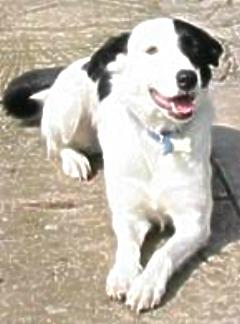 |
Sections on this page Introduction - The Three aspects of the Border Collie Jump to - The Kennel Club Border Collie Jump to - The ISDS Border Collie Jump to - The Unregistered Border Collie Go to the rest of the breed profile section For information on temperament, training, health issues, Origin, name and purpose and more |
|
|||||||
|
Phoebe
Sam The rest of this 10 page Breed Profile is divided into 9 sections, each one of which looks at a different aspect of the breed. Starting with origins, health, temperament, training, appearance, issues, needs, environment and running costs are covered. There is a link to the rest of the sections in the floating menu bar that rides down when you scroll the page, a link between Phoebe and Sam and other links at intervals down the page. |
|||||||||
| What makes a Border Collie? - it's not all 'Black and White'. | |||||||||
The three aspects of the Border Collie |
|||||||||
|
Not very much of the information in
this whole section has anything to do with the 'Breed Standard' or
Pedigree, as defined by the Kennel Club.
Dogs that fit into that definition form a small proportion of Border
Collies around today. This breed profile of the Border Collie takes into consideration all Border Collies. There are now three obvious 'classifications' of the breed. The first part of this page looks at how we got to this point and the following three sections cover the three distinct classifications. The Kennel Club registered Border Collie, The International Sheep Dog Society registered Border Collie. The unregistered Border Collie. |
|||||||||
PrologueSome of the dogs that are generally known to us as Border
Collies, if registered with the Kennel Club, have to
be registered as 'working sheepdogs' unless they are from KC
registered Border Collie Bloodlines, which allows them to register under the Border Collie title. The KC pedigree 'Border Collie' has little to do with the sheepdogs
that we see in farmers fields or in sheepdog trials, but to keep their
puppies viable KC breeders need to breed in genes from working dog lines to
stop their bloodlines being affected by recessive or deleterious traits Dual registration or KC registration is also allowed for pups with
both ISDS registered parents or an ISDS registered Dam with a KC sire. |
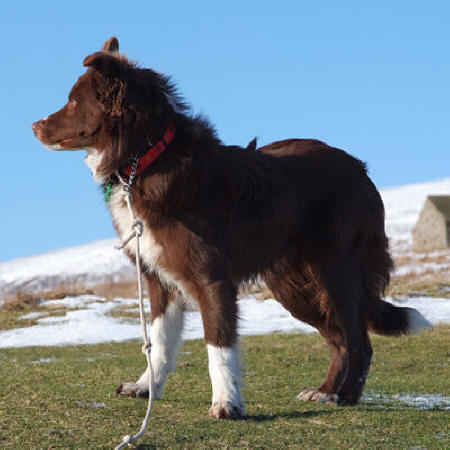 Kennel Club Registered |
||||||||
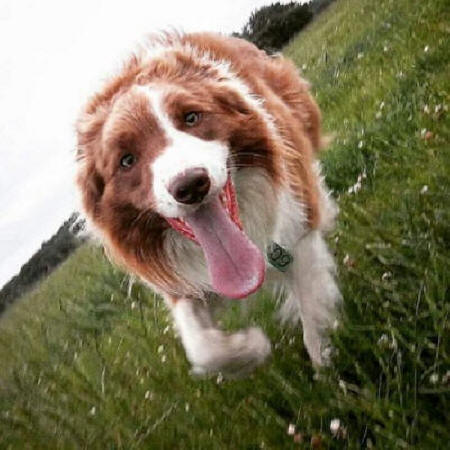 ISDS Registered |
What about the ISDS (International Sheep Dog Society) -
where do they come in? |
||||||||
|
It only seems confusing and
mysterious if your not used to the different systems and understand why
they both exist. So what about the rest of the 'Border Collies' - those
that are not from bloodlines registered with either organisation? There is great diversity in the appearance of such Border Collies
because many generations back when the breed became established as an
exceptional working dog farmers and shepherds bought pups and took them
home and bred them into their native working dog lines in order to add
the skills of the Border Collie into their own bloodline. |
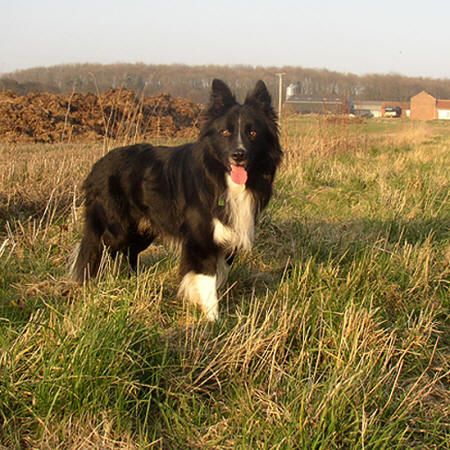 Unregistered |
||||||||
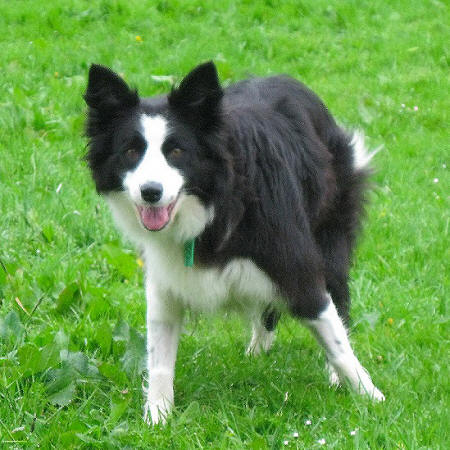 Unregistered |
Is it right to class these unregistered dogs as Border
Collies? It gets through to the pure lines eventually when an unregistered dog of dubious parentage gets accepted onto the ISDS register on merit and joins its blood to the ISDS pool that KC breeders call on to keep their lines healthy. A slow trickle of 'Hybrid Vigour'. This 'unclassified' category forms the biggest group of dogs we know as Border Collies and it is dogs from this unregistered selection that are most likely to end up in peoples homes as pets. This category includes most farm bred dogs, puppy farm bred dogs, small scale commercially bred dogs and casually bred dogs from occasional breeders who have not kept records of their bloodlines. They are all rooted in working lines with working instinct to one degree or another and are therefore capable of being unpredictable in their reactions in environments unsuited to them or when handled by people who have little experience and knowledge of the breed. |
||||||||
|
An environment and lifestyle that suits one of these dogs may not suit another
and this is the problem. It is difficult to see how any individual will
cope or settle down in a particular home. No two are really alike. They
may look very similar but seeing what's on the surface is not enough. |
|||||||||
|
Go to the rest of the breed profile section |
|||||||||
|
Kennel Club |
|||||
|
|
The Kennel Club Registered Border Collie |
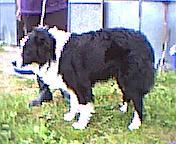
|
|||
| From Kennel Club Registered Bloodlines - Spruce (Left) and Mick. | |||||
The KC classes the Border Collie as a 'Pastoral' breed. So lets have a dig into the Thesaurus and look up some synonyms for - 'Pastoral' and 'Working', then see what the Dictionary has to say about 'Sheepdogs'. |
|||||
| Pastoral - meaning 'Bucolic' or 'Rural' | |||||
| Thesaurus -- Bucolic (adj.) - synonyms - Simple - Agrarian - Tranquil - Idyllic - Halcyon - Serene - Quiet. | |||||
| Thesaurus - Rural (adj.) - synonyms - Country - Countrified - Provincial - Rustic - Agrarian | |||||
| Thesaurus -- Working (adj.) - synonyms - Practical - Applicable - Applied - Active. | |||||
| Dictionary
- Sheepdog (noun) - A dog that watches and works with Sheep. |
|||||

|
So here we have - A serene, countrified, active dog that watches and works with sheep. Or - A simple, provincial, applied dog that watches and works with sheep. |
|
|||
| Pick your own combination from the above synonyms - add the noun - and make your own definition of a Border Collie! | |||||
|
The
Kennel Club (KC) stud book registers 'Pedigree' bloodlines that seek to
adhere to a Breed Standard, as defined by the KC for the purposes of
showing. This breed standard is based on appearance. Dogs are
judged by their conformity to this breed standard at 'exemption shows'.
Crufts is the top event in this category. There are many other exemption shows around the UK, most of which are qualifiers for the main event. Border Collies are not the only victims of conformity. The KC sets a breed standard for all breeds - if they choose to recognise a breed. As far as the KC is concerned, only Border Collies from bloodlines registered with the KC have the right to be described as Border Collies - the rest they call 'working sheepdogs' and can be registered for competition but not for showing. They don't need to be so pretty. |
|||||
| Registering
for competition means that a dog with no KC Pedigree can be entered into
KC regulated events run under KC rules and participate alongside dogs
with KC registered Pedigrees - but this does not extend to the Show ring
where only KC Pedigree dogs are allowed to enter. It may help to understand the structure of completion at the top level of exemption shows in the UK. Here is a brief summary. At Crufts each breed is judged in its own class against others of the same breed. There will be a male and female winner in the class that then compete against each other to be crowned Best of Breed. The KC puts similar breeds into Groups. There are seven groups. The Border Collie is in the 'Pastoral' group. Best of Breed winners of each breed in the group compete to become Best in Group. Each Best in Group winner then competes against the others for the ultimate title, Best in Show. You may ask what the point is and why people put their dogs through it all. This is not a natural thing for a dog to be doing. They have to put up with a lot. The answer is not complicated. At each level achieved the value of stud services or pups from the winner of that level increases. As well as exemption shows, the KC runs competitive events in various interactive disciplines like Agility, Flyball, etc. These events are run all over the country at various levels with competitors vying for a place to compete at the main event - Crufts. With reference to Border Collies, these events are open to all, registered or unregistered. Unregistered Border Collies need to be entered as Working Sheepdogs. All can compete against each other under Kennel Club rules. The path to Crufts in each of these discipline's follows the same path as that of the exemption dogs. Local, and regional qualifiers. The KC also registers and regulates dog clubs in these various disciplines and obedience trainers and classes who follow Kennels Club procedures. There are standards and qualification levels that are designed to encourage good and responsible dog ownership. |
|||||
 Pedigree registered Border Collie from Kennel Club lines - or is it a Fox? |
|||||
| Some KC Pedigree show lines can be as difficult to keep in the pet home as the average farm dog, but there are breeders on the KC register these days who claim to be breeding more for temperament than showing, and with the pet market in mind. | |||||
| A
possible advantage of taking one of these dogs to be your family pet is
that they are supposed to be bred, reared and socialised under a set of
rules and principals that will reduce the risk of you getting a dog with
hereditary problems or strong herding drive that would be a liability in
your home and around your family. Pedigree dogs exposed and more recent
revelations does cast doubt on these claims. There are good and bad breeders and some are only in it for the money, so it's buyer beware. You need to be aware that the Kennel Club is a private members club and is run by people elected by its members for the purposes of the benefiting its members, many of whom are dog breeders. It does not exist for the benefit of dogs. It is not a charity but it does put a small proportion of profits into a charitable trust that funds research into some aspects of dog welfare. Mainly health and factors relevant to its members. |
|||||
| It has to be said that these days that there is no guarantee of that a KC bred BC will meet these requirements or make a suitable pet and that the same basic precautions should be applied if you seek to take a dog from any source. | |||||
|
---------------------------------------------------------------------------------------
The Border Collie has been around long before the KC became involved. KC registered bloodlines form the smallest proportion of Border Collies in existence today, however the KC does have a strong influence on the fortunes of any breed it recognises. The Border Collie was recognised in 1976.
ISDS pedigree bloodlines make up a rather
more substantial group of Border Collies, however the vast majority of
Border Collies are unregistered working bloodlines kept by farmers and
stockmen for herding purposes.
The use the description 'working sheepdog' by the KC implies lowlier breeding and
therefore less value than a KC registered 'Border Collie' from a KC registered
line. It adds weight to the claim that KC registered breeders should
be able to charge higher prices for their pups than could be
achieved for a 'working sheepdog'. If an unregistered Border Collie
fetches 3 to 4 hundred pounds, obviously a registered one is worth
more.(?)
In that context the term is a misuse of it's
original application which was given to dogs that had high value because
they were of use to man in a working capacity. They help put food
on tables and contributed to the countries economy in a big way. The
term attempts to
stand logic on its head, implying that a dog that does the work of 10
men is of less value than one bred to be a pet and
companion or look good in the showring.
The word 'Collie' means useful in 'the Gaelic'. A 'collie dog' - a
useful dog. The word Border in the name describes the marches of
England and Scotland and England and Wales where the breed was
originally developed. So - Border Collie - 'a useful dog
from the Borders'.
Working sheepdogs had nothing to do with pedigrees or breed standards to govern appearance. A working sheepdog was a dog with a purpose.
If a KC enthusiast tells you that your dog
- the dog you think is a Border Collie is, in reality, a working sheepdog
because it has no pedigree, don't be offended. The use of the term in this way
implies a limited knowledge of the breed by the user and a narrow perspective
to the extent of the breeds history development, purpose and abilities and should
not be taken too seriously.
The BC has certainly been around for at least a couple of hundred years, possibly since the early 1600's. The KC only became involved in 1976! You certainly do not have a working sheepdog if your dog does not work sheep. It is confusing and misleading to described it as one that does. Actually, the last thing you want in your living room is a working sheepdog unless it is working sheep. One that is frustrated because it wants to, but is not able or allowed to work sheep can be a big problem! That's why it pays to be very carful in acquiring one as a domestic companion. |
|||||
|
Go to the rest of the breed profile section |
|||||
The ISDSThe International Sheep Dog Society Border Collie |
|||||
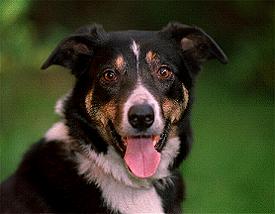
|
|||||
|
Nell - Dot - Flint |
|||||
|
The ISDS was formed in July 1906 by a group of Shepherds and Sheep Dog enthusiasts from Scotland and the English Border Counties who banded together under the chairmanship of George Clark, with J Wilson as secretary and a committee of 10 into the International Sheep Dog Trials Society. Their first official trial was held near Edinburgh in August that year and attracted 27 entries and a profit of £9. |
|||||
| The
winner of that first event was Richard Sandilands who ran his dog Don.
The dogs and handlers came from Scotland and England. |
|||||
| However,
Sheep Dog trials had been going for some time before that, with
the first recorded 'International' trial taking place at Bala in North
Wales in 1873 between Welsh and Scottish Shepherds. All the dogs
running in the first ISDS trial were winners of commendations at
previous local events. |
|||||
| The
stated object of this group was to increase public
interest in the work of the Shepherd, improve the qualities of the
Sheep Dog and provide support for members and their widows. No
doubt these founding members would have been proud to have witnessed the
first 'World' Sheep Dog Trial which took place at Bala, Wales in
September 2002. It was clear by the public attendance and
media coverage of this event that interest had indeed been increased.
People came from all over the world to see the best of the best
compete. Much was televised and the finals on Sunday went out live
on channel S4C. We were there. It was a great event with so many Border
Collies of all shapes and sizes. |
|||||
| The
Societies influence is now world-wide, as is its membership. Every country
has it's own version of the
Kennel Club, but there is only one ISDS. Like the Kennel Club, the ISDS is a club of breeders but it is also a registered charity so all it's income has to be applied for the furtherance of its objects. It has very few paid staff and the events and trials it runs are organised and staffed by volunteers. |
|||||
| Although
there are many sheepdog breeds throughout the world, the ISDS is the
custodian of the International stud book for Border Collies in their
capacity of Working Sheep Dogs. This facility was instituted in 1915 by
the, then, secretary, James Reid. The first volume was published
in 1955 and contained, as its first entry, details of a bitch named 'Old
Maid'. There have been attempts in the past to open supplementary
registers within the ISDS for other sheepdog breeds, but so far this has
proved unsuccessful. |
|||||
 Nap and Jess - Unregistered working Border Collies from Pedigree ISDS lines - just having a romp |
|||||
| The
ISDS stud book registers only the offspring of existing ISDS registered
parents, although it is possible within their regulations for a good
unregistered Border Collie to be accepted and registered because of its
outstanding ability on the trials field. When such a dog is accepted and
registered it is said to be registered 'on merit'. This is not
that common an occurrence, but the Society is open to such and it does bring new blood
into the registered lines and increases their vigour. Subsequently that
new blood eventually finds it's way into KC lines. |
|||||
| Strict
rules govern the admission of pups into the ISDS
register. Notice of the mating has to be submitted to the
Society within 14 days of the pairing on a supplied card. On
approval of this notice a form is sent out for the Registration of the
litter which must be filled in and returned within 4 months of the date
of birth. A certificate of verification is also supplied by the
Society for each litter registered. This should be filled in by a Vet to confirm that the mother declared is truly the mother of the litter. Not only do the Sire and Dam have to be existing registered dogs, but they must also be screened and proven free of hereditary eye conditions such as Centralised Progressive Retinal Atrophy and Collie Eye Anomaly, so that these conditions cannot have been passed on to the pups The owner of the Dam must also be a member of the ISDS. If all these criteria are met, the society will issue consecutive registration numbers for each puppy in the litter, and in the case of litter born outside of the UK, the number will have a prefix letter or letters to indicate the country of origin. |
|||||
| In
this way, the ISDS seek to ensure that Border Collies registered in
their stud books have been properly bred and screened and their lineage
traced clearly on collation of pedigree. It also clearly indicates
through pedigree research, the qualities or faults likely to be found in
succeeding generations and allows the purchasers of registered puppies
to make an informed choice as to whether a particular pup is likely to
develop the qualities they are seeking. Dogs registered with the ISDS
are registered as Working Sheep Dogs, although the Society does not
insist that such registered dogs need to actually be working in a
'professional' capacity. |
|||||
 Pedigree registered Border Collie from ISDS lines |
|||||
| Dogs
registered with the ISDS are the only dogs entitled to enter sheepdog
trials run under ISDS rules, but any dog and handler, from any walk of
life, can enter local open trials - providing the dog is trained to sheep!
If the dog proves it's worth in open trials it may be registered on merit. These ISDS registered lines are bred to work and they do appear to be more intelligent than the KC lines. Because of this breeding they are not domestic pet material. Some individuals may make suitable Agility dogs or Flyball dogs. As it is a members club it is influenced by its members and over recent years many breeders of Border Collies from the Kennel club have joined its ranks. Dual registration is becoming popular and in some instances it does work both ways. Like the KC it has good and bad breeders. One major difference is that, unlike the Kennel Club, it does not have any attraction for big (or small) commercial breeders to join because the main purpose of registered dogs is to work and the main market of puppy farmers is to sell to the public. Most of these breeders stick to the Kennel Club where it is easier to get pups registered and the screening process is less strenuous. |
|||||
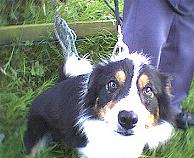
|
|||||
| Blake - Lael - Boz - Dell | |||||
|
Go to the rest of the breed profile section
|
The
rest of the Border Collie clanThe unregistered or Non Pedigree Border Collie |
|||||
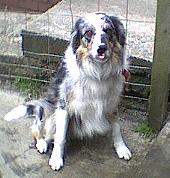 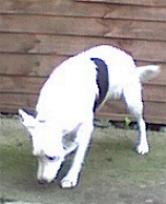 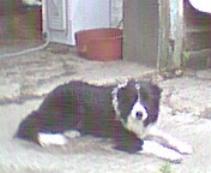 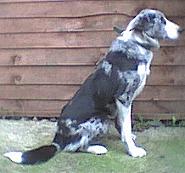 |
|||||
|
This is by far the largest category of Border Collies around today and some, mainly from farm stock, will have their origin in strong and ancient bloodlines rooted in working dogs going back many generations. Some will be privately bred in puppy farms or by backyard breeders for profit or hobby breeders for the sake of the love for their dogs and their desire to replicate them. All will have links back to working bloodlines but no pedigree to show it. Because there is generally no research or regulation to their breeding, very few of these dogs or their ancestors will ever have been screened for hereditary disease. In some case hereditary issue would be obvious to the initialed but unnoticed by the breeder because they didn't know. The signs may also pass unnoticed by people wishing to purchase the,. Taking any unregistered dog carries a risk of acquiring a dog that may prove to have a variety of health and/or behavioural problems. Additionally, because unregistered dogs directly from working backgrounds are bred by shepherds and farmers precisely for the working ability of the puppies, many of these dogs will have strong chase and herding instinct which will make them problem pets in a domestic environment. It should also be said that not all KC or ISDS registered pedigree breeders are as good as they should be. Some lines have been spoilt by intensive inbreeding, intended to cement and re-enforce required traits but resulting in offspring with terrible temperament and physical problems. Deliberate breeding of merles is an example. It carries high risk of serious physical and temperament issues even if you know what you're doing. Merling is cased by a genetic abnormality. It can occur naturally. When it does it's usually brown and white on black. The genes that create the patterns of flecking in the coats of merles go hand in hand with genes that can cause blindness, deafness, bowel problems and other issues. Some individuals will breed from dogs they have purchased from these registered lines thinking they will produce high quality puppies with good pedigree backgrounds but all they are doing is passing on problems to future generations and polluting the overall gene pool of the breeder. Hereditary problems may come out in the offspring of the affected parents but in some cases the pups can carry the problems without manifesting them and pass them on to future generations who do. Private individuals from all walks of life are seeking to breed pets from unregistered dogs, but this is very risky indeed as most of these individuals really do not understand what they are doing and the results are hit and miss to say the very best about them. Breeding is a science based on a knowledge of genetics, hereditary diseases and behavioural problems, without which problems are inevitable. |
|||||
 Farm Bred Border Collie. Unregistered. Advancing on the sheep. |
|||||
| The
only Border Collies that will make good pets are those non-workers with
little or no residual herding instinct, whether registered or not. One other matter to clear up - at the start there was mention of the KC only recognising non pedigree Border Collies as mongrels. There is a difference between a mongrel and a crossbreed. A mongrel is a dog of no particular defined type. There may be many breeds in its ancestry, it's sire and dam may have many breeds in their ancestry so it can't really be classified by name as anything in particular. A crossbreed is the result of a pairing between two different breeds of dog. Two breeds are crossed to produce puppies of a certain type. The qualities of the puppies are supposed to reflect the best qualities of both breeds - although this is not always the case! Border Collies crossed with Labs or Retrievers are generally a lot less intense than a Border Collies but more focused than a Lab or Retriever. Border Collies crossed with German Shepherds tend to be larger and more inclined to guard than chase. Border Collies crossed with any breed of Spaniel are generally not a very good idea by any standards - but it happens! For many domestic applications a Border Collie Crossbreed is more suited. The intensity of the Border Collie is diluted but it's loyalty and overall appearance remains pretty true to the breed and it is much more likely to adapt to urban and suburban environments. Border Collie genes tend to dominate the appearance of crossbreed mating's and produce pups that look a lot like Border Collies with less issues. |
|||||
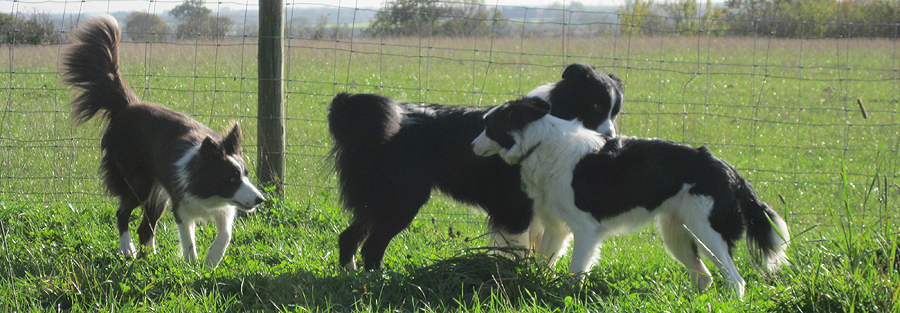 Three Border Collies - One ISDS Pedigree, One KC Pedigree and One farm bred with no Pedigree. |
|||||
|
The breed profile section menu is directly below |
Go to the rest of the breed profile section For information on temperament, training, health issues, Origin, name and purpose and more |
Privacy, Personal Data and Cookies
If you are interested in adopting a Border Collie from us,
please phone 01644 440654 during office hours.
(2 pm to 5 pm Tuesdays to Thursdays)
Please do not write to us or email us about adoption - we want to speak to you before we start the process.


